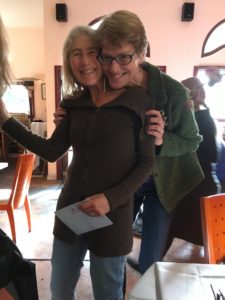 Do you approach interviewers as friend or foe? For most of us the attitude is one of doing battle. After all, there is a perceived power mis-match and the interviewer has the ultimate power. You think you have to prove your worth. You have to be strong and sure-footed. That attitude can morph into assuming you’re adversaries, that there is a winner (and loser).
Do you approach interviewers as friend or foe? For most of us the attitude is one of doing battle. After all, there is a perceived power mis-match and the interviewer has the ultimate power. You think you have to prove your worth. You have to be strong and sure-footed. That attitude can morph into assuming you’re adversaries, that there is a winner (and loser).
Many of us are employing Amy Cuddy’s famous “power pose” to build our internal sense of strength and confidence. We don’t want to revert to cowardice or nervous postures that diminish our presence.
Let’s put aside the power pose for a moment and put on the spirit of friendship. Imagine walking into an interview with the intention of being a friend, and with that imagining the possibility of camaraderie, kindness, easy rapport, give and take, and receptivity.
Think to a time when you were getting together with a friend. Pick someone you really enjoy spending time with, a person who breathes fresh air and life into your thoughts, a person who opens your heart and feeds your soul. I’ll bet you have at least one friend who nourishes your sense of well being.
What’s your “approaching a friend” posture? Here are some of the physical qualities you may experience: softening, breathing with ease, relaxed, excited (yes both relaxed and excited at the same time), attentive, open-ness (open ears, open eyes, open heart, open mind), and flexible.
Key attributes of friendly interactions are softening and opening, which translate on an emotional level into availability and interest. Another key physical attribute is flexibility. Think of this in contrast to rigidity … the extreme embodiment of taking a stand and asserting a position. In a healthy friendship, we are open to different opinions. There is give and take.
Let’s turn the spirit of friendship posture to a job interview.
- You walk into the room interested and eager for conversation.
- You want to share information about your good works, you want to know what is important to the employer.
- You seek out shared values, places of commonality, places where you have similar interests.
- You listen openly, you breathe and let the interview flow.
You let the interviewer know you have attributes that make a good friend:
- Trustworthiness
- Honesty
- Dependable
- Loyal
- Easily trusted
- Empathetic
- A good listener
- Supportive in good times and bad times
- Able to see humor
- Of course, it’s a two-way street. You look for qualities of a good friend in the interviewer, particularly listening for values and attributes that show the ability to build trust, be dependable and be supportive.
What’s different in the “spirit of friendship” approach is that you walk in with a posture of openness and receptivity rather than one of closed, nervous and “it’s all on me to be perfect and unnatural”.
Remember that, like the power pose, the spirit of friendship begins at a physical level and greatly influences our emotions. When we’re with friends we are relaxed, confident and enthusiastic. We can breathe and speak without the brain-fog caused by fear.
Prepare for your next interview by imagining you are about to meet new friends, friends who have been vetted because they are interested in the same business or profession that you’re in. Smile softly and enjoy the beginning of the courtship.